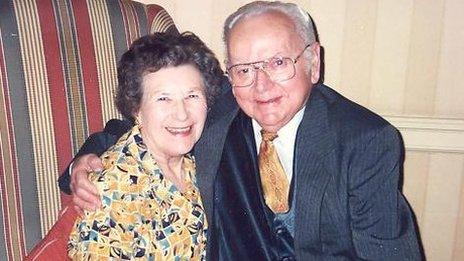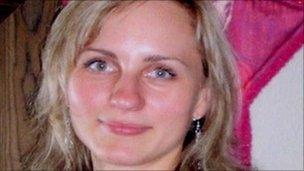Una Crown murder: Crimewatch reconstruction appeal
- Published

Una Crown, pictured with late husband Jack, lived alone in her bungalow
An 86-year-old woman murdered in her Cambridgeshire home was "very security-conscious" and may have recognised her killer, Cambridgeshire Police said.
Una Crown was found in her bungalow in Magazine Lane, Wisbech, on 13 January. She had been stabbed and her body burned in a bid to destroy evidence.
Officers have not found the knife used to kill Mrs Crown.
A reconstruction of her last-known movements will feature on the BBC's Crimewatch programme later.
Det Insp David Grierson, leading the investigation, said: "Una habitually locked herself in her house when she was there alone.
"She would check who was at the door if anybody called, so I strongly suspect she either recognised the person at the door, or had good reason to open it to a stranger.
'Missing property'
"I believe she was attacked fairly instantaneously after speaking to, or confronting this person at her front door."
He said officers were appealing on Crimewatch for "that vital piece of information or evidence that tells us who was responsible for this".
"We still haven't found the knife which was used to kill Una," Mr Grierson added.

Cambridgeshire Police will also tell Crimewatch how they traced the killer of Vitalija Baliutaviciene
"There could be some property missing from her house which will be revealed on Crimewatch."
Police said Mrs Crown was last seen on Friday 11 January, but made a telephone call to a friend at about 17.00 GMT the following day.
They believe she was murdered some time between Saturday night and Sunday morning.
A 58-year-old man arrested in late January in connection with the investigation remains on bail until 15 May.
On the same Crimewatch episode, Cambridgeshire Police will reveal how they brought another woman's killer to justice.
Rimas Venclovas, 48, was jailed for life at the Old Bailey in November after being convicted of the kidnap and murder of his ex-wife Vitalija Baliutaviciene.
The 29-year-old had gone missing after leaving her Peterborough home last August.
A satellite navigation system seized from Venclovas' home in Lithuania was key to the case, detectives said.
It was used to trace his journey through six countries, eventually leading to the discovery of Ms Baliutaviciene's body in a shallow grave in Poland.
- Published17 April 2013
- Published25 February 2013
- Published1 February 2013
- Published30 January 2013
- Published29 January 2013
- Published21 January 2013
- Published18 January 2013
- Published17 January 2013
- Published16 January 2013